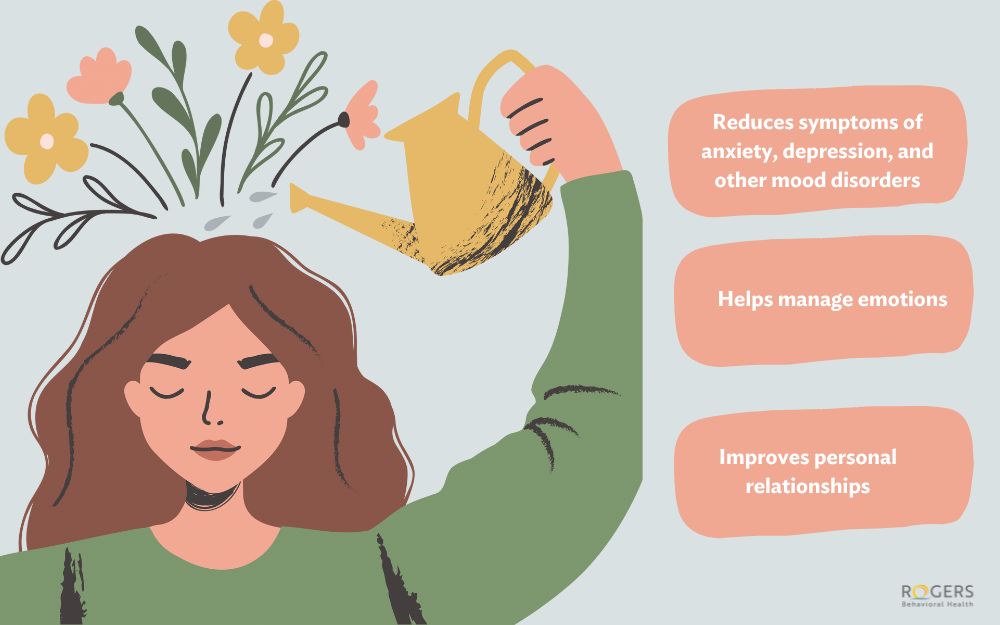Adele Routliff’s earliest memory of using sign language with her mother carried an unexpected lesson. As a young girl, she reached out to sign in a public space, only for her mother to gently stop her. Raised in a school environment where signing was punished, Adele’s mother internalized deep shame about using sign language openly. It wasn’t rejection—it was fear. Adele later realized this moment reflected a more significant issue rooted in stigma and silence.
That formative experience led Adele toward a career in American Sign Language (ASL) interpreting, with a focus on mental health. Through workshops, curriculum development, and advocacy, she’s helped amplify the often-unheard voices of Deaf individuals in mental health spaces. However, the work, although fulfilling, doesn’t come without an emotional cost. Mental health interpreters face complex, emotionally intense settings that leave many at risk of burnout. This article examines why and how mindfulness can offer a promising strategy for enhancing resilience.
The Emotional Toll of Mental Health Interpreting
Understanding the Interpreter’s Role
Mental health interpreters bridge critical communication gaps between Deaf clients and healthcare providers. They serve in emotionally intense situations—therapy sessions, crisis interventions, medical consultations—where every sign, gesture, and facial expression carries meaning. The job requires not just linguistic fluency but emotional endurance.
Unlike many roles in healthcare, interpreters do not offer solutions or support; their task is to relay information, not resolve issues. This can be psychologically draining, mainly when tasked with interpreting stories of trauma, loss, and mental illness. The interpreter becomes a silent witness, fully immersed in emotionally charged environments, yet powerless to change the outcomes.
Vicarious Trauma and Emotional Overload
Exposure to such high-stress scenarios can lead to vicarious trauma and emotional fatigue. Mental health interpreters often internalize the emotions they’re translating. This can blur professional boundaries, primarily when interpreters identify closely with the client or when the content is traumatic.
One interpreter described feeling the need to emotionally detach after particularly harrowing sessions. While neutrality is a professional standard, maintaining it requires significant emotional labor. With repeated exposure, that labor can evolve into burnout—an occupational hazard not often addressed in interpreter training.

The Hidden Stress in Medical and Mental Health Settings
Burnout Beyond the Surface
Interpreters in medical and psychiatric environments may face recurring ethical dilemmas, moral distress, and the constant demand to remain professional amid emotionally turbulent scenarios. Whether interpreting end-of-life conversations, mental health assessments, or childhood trauma disclosures, each session leaves a mark.
The stress is compounded by the physical demands of sign language interpreting, which engages the entire body. Fatigue doesn’t just affect muscles; it seeps into concentration and emotional resilience. Over time, even seasoned interpreters find their ability to remain emotionally neutral challenged.
The Role of Under-Recognition
Another source of interpreter stress stems from being unseen. While doctors and therapists are often acknowledged for their work, interpreters tend to operate in the background despite being essential to communication. This lack of visibility can contribute to professional isolation, creating an emotional disconnect from the teams they support.
Why Deaf Mental Health Requires Specialized Interpreters
A Community Often Overlooked
Deaf individuals face unique challenges in mental health access. Misdiagnosis, communication barriers, and lack of early language exposure often prevent accurate assessment or treatment. These issues require interpreters with a nuanced understanding of both mental health terminology and Deaf culture.
Interpreters must constantly navigate linguistic gaps—interpreting not only words but also emotional nuance, medical jargon, and unspoken context. This level of skill demands rigorous training and continuous emotional self-regulation.
Adele’s Mission for Better Support
Adele Routliff recognized the gap and responded by developing interpreter training programs explicitly focused on mental health. Through Canadian Hearing Services, she assists new interpreters in preparing for the emotional intensity of their work. Her personal experience drives her advocacy, pushing for systems that better protect interpreters from burnout.

How Mindfulness Offers a Practical Support System
What Mindfulness Looks Like in Practice
Mindfulness is more than meditation; it’s the practice of staying aware of the moment without judgment. For mental health interpreters, it offers a tool to manage emotional intensity and maintain professional composure without internalizing distress.
Mindful practices, such as breathwork, body scans, or reflective journaling, can help interpreters process emotionally heavy sessions. These techniques foster emotional regulation, enabling interpreters to remain present without becoming overwhelmed.
Adapting Mindfulness for Interpreters
A recent study examined the potential benefits of Mindful Practice in Medicine (MPIM), initially designed for physicians and medical interpreters. Results showed reduced stress and improved emotional awareness among both spoken and sign language interpreters. Participants also valued group mindfulness sessions, where shared experiences created a sense of connection and mutual understanding.
These findings suggest a growing need for wellness programs tailored to interpreters. Jane, a seasoned interpreter, found informal mindfulness practices—such as a quiet walk before work—instrumental in navigating difficult days. Simple changes in routine allowed her space to breathe, reflect, and reset before re-entering emotionally charged environments.
Supporting Interpreter Wellness Through Education
Building Resilience Through Training
Professional development programs that include mindfulness techniques can help interpreters better manage the realities of their roles. Embedding emotional wellness modules into interpreter certification programs allows for proactive coping strategies rather than reactive burnout responses.
Training sessions might explore mindful communication, stress-reduction tools, or recognizing emotional overload. These not only benefit the interpreter but improve overall service quality, ensuring more consistent and effective communication for clients.
Creating a Community Among Professionals
Peer support is also essential. Interpreters benefit from spaces where they can safely share experiences and reflect without fear of judgment. Online forums, moderated debriefing sessions, and wellness circles provide emotional outlets and foster a sense of solidarity.
Jane recalled how talking with fellow interpreters helped normalize her experiences. Hearing that others had also struggled made her feel less isolated, reinforcing the importance of structured support systems.

FAQ’s
What is vicarious trauma in interpreting?
Vicarious trauma occurs when interpreters absorb the emotional pain of others through repeated exposure to distressing content, affecting their mental health.
Why are mental health interpreters at higher risk of burnout?
They regularly interpret emotionally intense conversations without emotional involvement, creating a disconnect that leads to stress and fatigue over time.
Can mindfulness actually help interpreters cope with stress?
Yes, mindfulness promotes emotional regulation, self-awareness, and stress reduction, helping interpreters manage challenging assignments with more resilience.
What are signs that an interpreter is experiencing burnout?
Symptoms include emotional exhaustion, lack of focus, physical fatigue, increased irritability, and difficulty maintaining professional neutrality.
Should mindfulness be part of interpreter training?
Incorporating mindfulness into training programs equips interpreters with tools to handle emotional stress and maintain mental clarity during assignments.
Conclusion
Mental health interpreters play a crucial role in ensuring communication and care for Deaf individuals. Their work places them in highly emotional situations that carry an increased risk of burnout and trauma. Mindfulness, when integrated into training and daily practice, provides a promising approach to emotional regulation and resilience. With the proper support, interpreters can continue to serve their communities while preserving their mental well-being.


